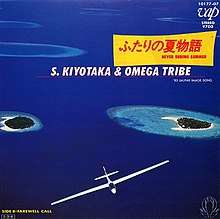Futari no Natsu Monogatari
Futari no Natsu Monogatari - Never Ending Summer (Japanese: ふたりの夏物語 Never Ending Summer, English: "Two Summer Stories - Never Ending Summer"), also known as Futari no Natsu Monogatari (Japanese: ふたりの夏物語, English: "Two Summer Stories") is the fifth single by Kiyotaka Sugiyama & Omega Tribe, released by VAP on March 6, 1985.
| "Futari no Natsu Monogatari" | ||||
|---|---|---|---|---|
 | ||||
| Single by Kiyotaka Sugiyama & Omega Tribe | ||||
| from the album Another Summer | ||||
| Language | Japanese | |||
| English title | Two Summer Stories - Never Ending Summer | |||
| B-side | "Farewell Call" | |||
| Released | March 6, 1985 | |||
| Genre | Pop[1] | |||
| Length | 8:45 | |||
| Label | VAP | |||
| Composer(s) | Tetsuji Hayashi | |||
| Lyricist(s) | Chinfa Kang | |||
| Producer(s) | Koichi Fujita | |||
| Kiyotaka Sugiyama & Omega Tribe singles chronology | ||||
| ||||
Background
The single, which became the band's highest charting single, was completed in three days, according to Tetsuji Hayashi. At that time, Hayashi was busy with the work of producing music for all artists, but the tie-up of Omega Tribe's Japan Airlines TV-CM was decided, and it was a situation where he could not complete the composition one day early. After that, a person Hayashi knew gave him the advertising slogan, "Only you, kimi ni sasayaku, futari no natsu monogatari!" (Japanese: Only you 君にささやくふたりの夏物語; translation: "Only you, whisper to you, two summer stories"). Hayashi started to write the song alongside Chinfa Kang, and it was completed in one day.[2]
When the song was completed in a total of two days in this way, the members, who were currently on a national tour at the time, sewed up between the tours and returned to Tokyo to complete the recording. Hayashi said on his own website, "I don't know because the song I finished in just three days became Omega's biggest hit." In addition, Kiyotaka Sugiyama said, "is a rush construction undertaking, Kyushu from Tokyo of the airplane was remember the lyrics in " telling when it appeared on the program.
Chart performance
The single was the band's biggest hit, selling 380,000 copies and peaking at the #5 position on the Oricon charts.[3] The song was featured on The Best Ten and on The Top Ten, but since the band had disbanded at the end of 1985, the song did not appear in the program at the end of the year.
Soundtrack appearances
- The song was used as Japan Airlines's JALPAK '85 image song.
- The song was included in the album Another Summer, but was remixed in the album. Another remix was included in the greatest hits album Omega Tribe Groove by Eiji Uchinuma and Mizuo Miura.
- On July 13, 1985, Fuji TV broadcast Live Aid, and showed off the song.
- On June 18, 2014 , this song was ranked 10th in the "popular love song chosen by people over 50" in the Nippon TV program, 1番ソングSHOW.
Track listing
Single
| No. | Title | Lyrics | Music | Arrangement | Length |
|---|---|---|---|---|---|
| 1. | "Futari no Natsu Monogatari - Never Ending Summer" (ふたりの夏物語 Never Ending Summer) | Chinfa Kang | Tetsuji Hayashi | Tetsuji Hayashi | 3:57 |
| 2. | "Farewell Call" | Yasushi Akimoto | Shinji Takashima | Ken Shiguma | 4:47 |
Charts
Weekly charts
|
Year-end charts
|
Cover versions
Joey McCoy version
In 1991, American singer Joey McCoy, previously a backing singer and vocalist of Carlos Toshiki & Omega Tribe, covered the song in English on his album Summer Time Memories.
References
- "S. Kiyotaka & Omega Tribe – ふたりの夏物語 - Never Ending Summer". Discogs.
- "【1985年5月】ふたりの夏物語/わずか3日で完成 オメガトライブ最大のヒットも… ([May 1985] Summer story of the two / Completed in just 3 days Also the biggest hit of Omega Tribe...)". Sponichi Annex. May 26, 2011.
- "Hits of the World". Billboard. July 6, 1985. p. 73. Retrieved June 6, 2020.
- "Hits of the World". Billboard. June 2, 1985. p. 65. Retrieved June 6, 2020.
- "Hits of the World". Billboard. March 30, 1985. p. 67. Retrieved June 6, 2020.
- "Hits of the World". Billboard. March 23, 1985. p. 63. Retrieved June 6, 2020.
- "Hits of the World". Billboard. June 1, 1985. p. 65. Retrieved June 6, 2020.
- "Hits of the World". Billboard. April 6, 1985. p. 65. Retrieved June 6, 2020.